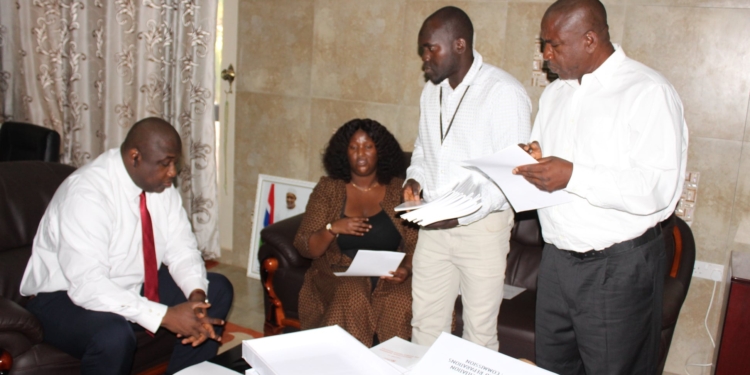By Waceke Njoroge
Hope of justice for the victims of Yahya Jammeh’s regime has been revived with the announcement that the Truth, Reconciliation and Reparations Commission is expected to present its much-awaited final report to President Adama Barrow on November 25, 2021.
In a brief press statement, the commission said it would hand over the report at 10am Gambian time “following consultations between the Attorney General and Minister of Justice, Hon Dawda A. Jallow, and the Chairman of the TRRC, Dr Lamin J. Sise”.
According to Essa Jallow, the TRRC’s director of communications, the commissioners will then hold a press briefing at 1pm at the commission’s premises in Kotu.
National and international human rights organisations have been pushing for the implementation of the recommendations expected in the TRRC report in order to ensure that the culprits of the Jammeh-era human rights violations are held accountable.
There has been concern in the past few months about President Barrow’s commitment to his earlier promise to implement the TRRC recommendations, especially as the December 4 presidential elections approached.
Concern was heightened when the president’s National People’s Party formed a political pact with the former ruling Alliance for Patriotic Reorientation and Construction as Barrow sought to win a second term. His retention in office of officials of the former regime, some of whom have been adversely mentioned in connection with the violations of Jammeh’s regime, has aroused suspicions that the president was not willing to ensure the prosecution of culprits.
The truth commission was at first scheduled to release its report at the end of July, 2021, but the date was pushed forward two months, to September 30. However, the report failed to materialise on that day, with the commission saying it was still working on it. On its Twitter page, the commission reassured Gambians that the report would be out “soon”, but did not give any definite date. “The commission assures that this final phase of its work will not be prolonged,” it said.
The TRRC was launched on October 5, 2018, with the mandate to look into alleged human rights violations during the rule of Jammeh. It heard testimony from nearly 400 people from January 2019 to May 2021. Witnesses gave evidence about state-sanctioned torture, rape, and murder at the hands of Jammeh’s death squad, the Junglers.
Jammeh came to power after leading a coup in July 1994. Following his defeat by Barrow in the December 2016 elections, there was a six-week standoff that ended with the military intervention of neighbouring countries and Jammeh’s flight into exile in Equatorial Guinea.
Jammeh has seemed emboldened in the months preceding the elections, addressing political rallies remotely from exile despite warnings from Barrow that his interference in the polls would not be tolerated. He recently spoke remotely at a public meeting of Mama Kandeh, the presidential candidate he has endorsed. The former president claimed that the 2016 elections were “rigged” and accused Barrow of “destroying the country in four years”.
“I want to assure you that … if you vote for us, you are going to have all of what I’ve told you… That is free education, free medical care for all Gambians … and Gambia will be developed to a point where it will be one of the most developed countries in the world,” he told party supporters.
Speakers at a recent public forum organised by the Gambia Bar Association, the Institute for Human Rights and Development in Africa, and the International Commission of Jurists said Jammeh and other high-ranking officials in his regime should be tried in a hybrid international court.
The report and its recommendations hold out much hope for victims that justice will be served and that they will receive reparations. The incoming president will be under intense scrutiny to see if he implements the recommendations as a precursor to seeking justice and reparations for the victims.







